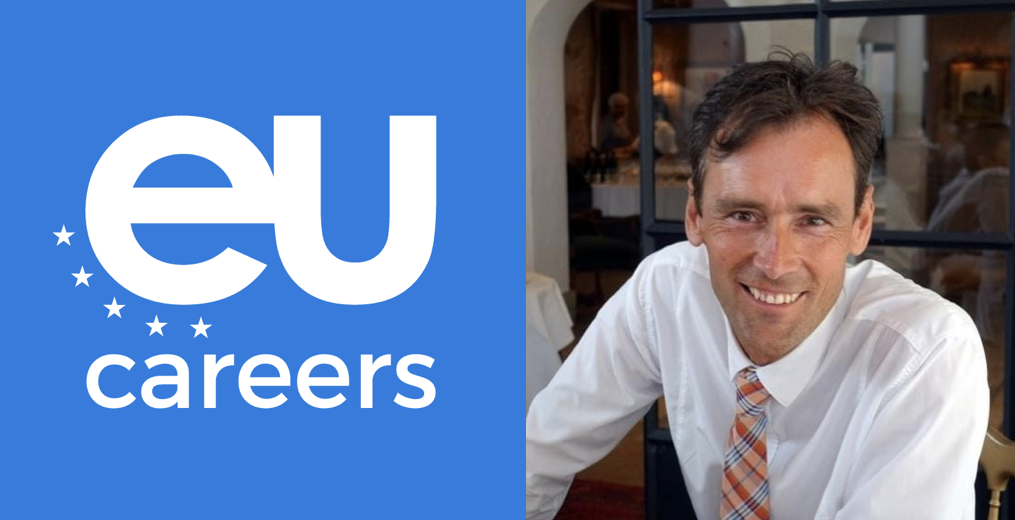This website uses cookies so that we can provide you with the best user experience possible. Cookie information is stored in your browser and performs functions such as recognising you when you return to our website and helping our team to understand which sections of the website you find most interesting and useful.

Name: Koen Hendrix
Title: Team leader External communication
Nationality: Belgian
Residence: Brussels
1. How long have you been working for the European Personnel Selection Office (EPSO)?
I have been working in EPSO for twelve years now. I am heading the External Communications team so we are responsible for explaining and promoting EU career opportunities to interested people all over Europe.
2. What is your background? What did you do/study before working for the EU?
I studied graphic engineering and economics. Before joining the EU I worked in a Belgian publishers company. My first job at the EU was in the Publications Office in Luxembourg. After 3 years, I moved to the European Commission in Brussels where I worked for the Employment and Social Affairs Service, and then for the Maritime Affairs Service. After six years there, I joined EPSO.
3. What first attracted you to work for the EU?
The international work environment is very enriching. I mean, back at the time I liked to work in the Belgian publishing company, it was a nice place to work, but it was very mono-cultural and monolingual. Now, I am surrounded by colleagues from 28 different countries, different backgrounds and cultures, I speak different languages. It never gets boring.
4. What is the best thing about working for the EU?
One of the main assets in my view is the internal job mobility. On the one hand, as an EU official, you have a job for life, but this does not mean you will do the same job for the rest of your life. When you are up for it, you can switch between services, between Institutions and between cities. So, during your career, you can really develop, learn about new policies, explore new opportunities, which is all very enriching.
5. What are your proudest achievements within your career?
I think I can be quite proud of my presentational and representational skills. I give presentations on EU career opportunities to groups of students, journalists, Member State authorities and I receive nice feedback on that, so I seem to be doing something right there. I also represent EPSO on high-level meetings, which are quite challenging and intense but very enjoyable.
6. What has been your greatest challenge during your career? In my current role, I deal with a variety of tasks: giving presentations, producing audio-visual material, project management, people management, budgetary issues. This variety makes the job very interesting but also challenging sometimes. It involves a lot of prioritising and organising.
7. Is there anything about working for the EU that you did not expect when starting?
From the outside, the EU Institutions seem like an ivory tower full of grey bureaucrats who are detached from the real world. But once you work here, and you get to know the people working here, you notice that behind these walls and this bureaucratic image, there is an awful lot of talent and nice people. Brilliant minds, multilingual, very accessible and helpful colleagues. I was happily surprised.
8. What do you believe is/are the most important skill(s) needed for starting a career with the EU?
That’s a good question. Because we test indeed eight different competencies, throughout the different tests in the selection procedure. I’ll name them for you:
- analysis and problem solving
- oral and written communication
- delivering quality and results
- learning and development
- prioritising and organising
- resilience
- working with others
- potential to lead
9. Which profiles are currently the most attractive for a career in the EU?
We always need many lawyers, economists and linguists. But apart from these more ‘generalist’ profiles, we offer opportunities for any given background: we need auditors, finance specialists, scientists, web designers, journalists, psychologists, accountants, IT specialists. Anyone with a degree or some years of professional experience can take part in our selection procedures.
10. What would be the most useful piece of advice you would give to someone who would like to start a career with an EU institution/body/agency?
Some very practical advice: firstly, make sure you master two European languages on a very good level. Most of the tests you will sit in your second language. And secondly: practice the different tests. You may know that we attract large numbers of applicants and only the best ones get recruited after a long selection process. So as a candidate, you compete with top talent from all over Europe. So, I suggest you really train and practice the tests. Sample tests are available on our website.
We run competitions throughout the year. People can easily follow us on Facebook so they easily receive the updates of new opportunities. Some opportunities come back every year like the generalist profiles and legal profiles, every year in the summer we publish opportunities for linguists, and every winter we look for non-graduate profiles.
If you take part in a competition and fail at any given stage, you can always apply again in future competitions. The results of previous competitions are not taken into account.
I’d like to remind you of our eligibility criteria: all you need is the EU citizenship, a good command of 2 EU languages and a degree. If you meet those 3 criteria you can apply.
